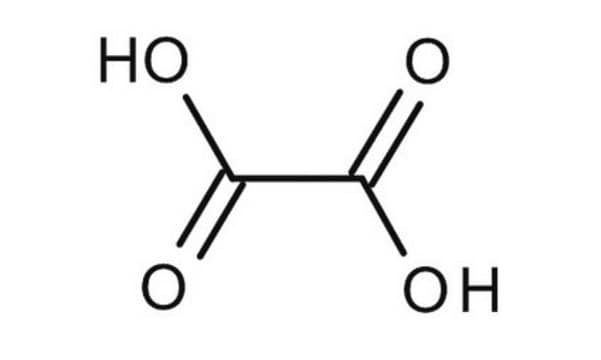All Photos(5)
About This Item
Linear Formula:
HO2CCO2H
CAS Number:
Molecular Weight:
90.03
Beilstein:
385686
EC Number:
MDL number:
UNSPSC Code:
12352100
PubChem Substance ID:
NACRES:
NA.22
Recommended Products
vapor density
4.4 (vs air)
Quality Level
vapor pressure
<0.01 mmHg ( 20 °C)
Assay
98%
form
powder or crystals
mp
189.5 °C (dec.) (lit.)
solubility
water: soluble 108 g/L at 25 °C
density
1.65 g/cm3 at 18.5 °C
functional group
carboxylic acid
SMILES string
OC(=O)C(O)=O
InChI
1S/C2H2O4/c3-1(4)2(5)6/h(H,3,4)(H,5,6)
InChI key
MUBZPKHOEPUJKR-UHFFFAOYSA-N
Gene Information
human ... SRC(6714)
Looking for similar products? Visit Product Comparison Guide
Related Categories
General description
Oxalic acid is a dicarboxylic acid used in dehydration, elimination, protection, deprotection, condensation, and decarboxylation reactions.
Oxalic acid is present as a potential impurity in some active pharmaceutical ingredients.
Oxalic acid is present as a potential impurity in some active pharmaceutical ingredients.
Application
Oxalic acid was used in determination of oxamic acid, oxalic acid, and oxamide in hydrophobic drug substance matrix by ion-exclusion chromatography. It was used in the synthesis of three-dimensionally ordered macroporous metal oxides or carbonates via templating with polystyrene spheres. It was employed as supporting electrolyte during electrochemical synthesis of polyaniline-polypyrrole composite coatings.
Signal Word
Danger
Hazard Statements
Precautionary Statements
Hazard Classifications
Acute Tox. 4 Dermal - Acute Tox. 4 Oral - Eye Dam. 1
Storage Class Code
11 - Combustible Solids
WGK
WGK 1
Personal Protective Equipment
dust mask type N95 (US), Eyeshields, Gloves
Choose from one of the most recent versions:
Already Own This Product?
Find documentation for the products that you have recently purchased in the Document Library.
Customers Also Viewed
Oxalic Acid
Hamilton GS
eEROS (Encyclopedia of Reagents for Organic Synthesis) (2001)
Characterization of polyaniline-polypyrrole composite coatings on low carbon steel: a XPS and infrared spectroscopy study.
Rajagopalan R and Iroh JO.
Applied Surface Science, 218(1), 58-69 (2003)
General synthesis of periodic macroporous solids by templated salt precipitation and chemical conversion.
Yan H, et al.
Chemistry of Materials, 12(4), 1134-1141 (2000)
L Yang et al.
Journal of pharmaceutical and biomedical analysis, 22(3), 487-493 (2000-04-15)
Oxalic acid, oxamic acid and oxamide are potential impurities in some active pharmaceutical ingredients (API). The retention and separation of oxalic and oxamic acids are particularly challenging using conventional reversed-phase HPLC due to their high polarity. An ion-exclusion chromatography (IEC)
Xianlai Zeng et al.
Journal of hazardous materials, 295, 112-118 (2015-04-22)
With the booming of consumer electronics (CE) and electric vehicle (EV), a large number of spent lithium-ion battery (LIBs) have been generated worldwide. Resource depletion and environmental concern driven from the sustainable industry of CE and EV have motivated spent
Our team of scientists has experience in all areas of research including Life Science, Material Science, Chemical Synthesis, Chromatography, Analytical and many others.
Contact Technical Service










